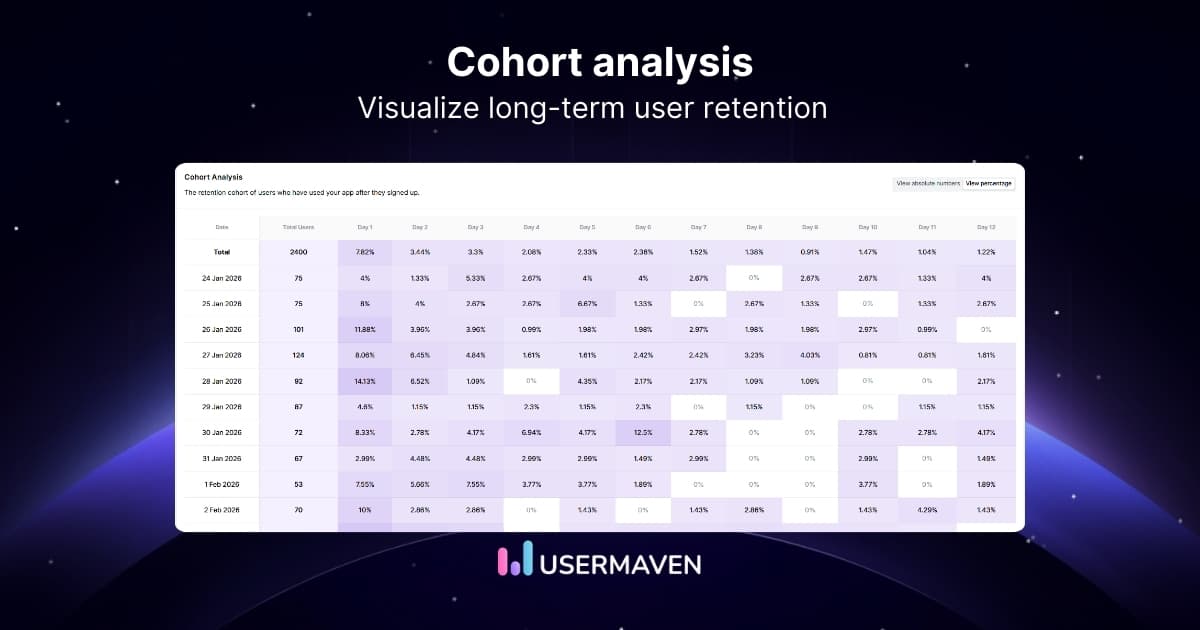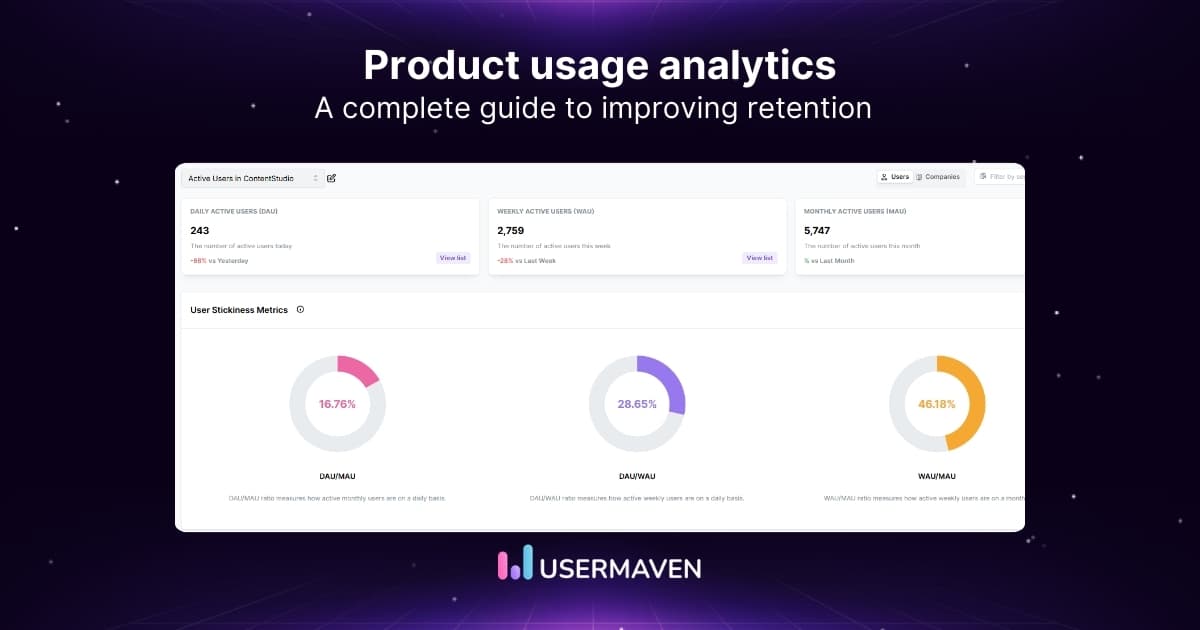What does artificial intelligence mean for product teams?
Dec 29, 2023
4 mins read
Written by Mahnoor Shahid

AI is not here to replace humans but to enable us to create customer-centric products.
Is artificial intelligence (AI) the game-changer we’ve been waiting for, or are we merely caught in the hype?
Get ready because soon, every company will be an AI powerhouse- well, that’s the reality knocking on our doors. But let’s cut to the chase!
What does artificial intelligence (AI) mean for product teams?
Artificial intelligence is not just a cool word; it’s changing how we make and improve products. It’s not about reading text; it’s about making things better for users. Think of companies not using AI—sure, you can live without it, but why miss out on making things easier?
For instance, Instead of just getting data insights, why not use an analytics tool with AI chatbots for instant analytics?
Let’s see how artificial intelligence is shaking things up in teams;
How is artificial intelligence impacting product teams?
In customer research, AI’s ability to process vast datasets is a game-changer.
- It dives into social media, reviews, and comments, offering insights through sentiment analysis.
- This deepens our understanding of customer sentiment. It also shapes proactive product roadmaps through predictive analytics.
- Beyond research, AI-powered automation streamlines routine tasks for product managers.
- This allows them to focus on the strategic and creative aspects of their roles.
In brief, artificial intelligence is revolutionizing product teams. It’s paving the way for a new era. This era is characterized by data-driven decision-making and more efficient operations.
How can artificial intelligence help in analysis?
AI-driven analytics and automation revolutionize customer understanding. This can be broken down into the following points:
1. Organizing data for analysis
Artificial intelligence can significantly enhance the process of organizing data for analysis within product teams by automating repetitive tasks, extracting valuable insights, and improving overall efficiency. Here are several ways in which artificial intelligence can contribute to organizing data for analysis:
- Data cleaning and preprocessing: AI algorithms can identify and handle missing or inconsistent data, ensuring the dataset is clean and ready for analysis. For instance, an AI system can automatically fill in missing values or standardize formats for dates and categories.
- Data categorization and tagging: Natural language processing (NLP) algorithms can be employed to automatically categorize and tag textual data. For instance, customer reviews can be analyzed to extract sentiments and categorize feedback into positive, negative, or neutral sentiments.
- Automated data indexing: AI algorithms can create indexes for datasets, making it easier for product teams to quickly search and retrieve relevant information. For instance, an e-commerce platform could use image recognition to automatically tag and index product images.
- Predictive analytics: AI models can predict future trends based on historical data, enabling product teams to proactively address potential issues or capitalize on emerging opportunities. For instance, predicting demand for certain features based on user behavior can inform product development priorities.
- Personalization and user segmentation: AI can analyze user behavior to create personalized experiences and segment users based on their preferences. For instance, an e-commerce platform can use AI to recommend products to individual users based on their past purchases and browsing history.
2. Finding insights from the data
AI-powered tools like chatbots are highlighted for customer interaction and feedback collection. These tools can transform the process by gathering feedback and user queries in real-time. In a collaborative setting, tools such as the Microsoft Teams AI note taker seamlessly capture meeting conversations and summaries within Teams, making feedback easier to organize and act upon.. These tools can transform the process by gathering feedback and user queries in real-time. Chatbots like Maven AI collect and analyze feedback, converting it into actionable insights. An AI agent can further enhance this process by autonomously identifying patterns and trends in the collected data, providing product teams with even more sophisticated and nuanced insights for decision-making.
Maven AI
Maven AI is an AI assistant chatbot of Usermaven. It can help you find insights from your data.
Below is an example showing traffic spike data by Maven AI; by asking a simple query, it can provide you with available traffic sources in its data sets.
If you have questions about your website/product data, simply ask questions in simple language.
For a better understanding, you may watch the demo video of Maven AI.
Here are a few sample inquiries you can direct to Usermaven regarding your product:
Example queries
- “What was our website traffic last month?”
- “Which page had the highest bounce rate this week?”
- “Name the top three referral traffic sources.”
- “What’s the average session duration from social media?”
- “How many unique website visitors did we have last quarter?”
Once you receive the answers to these questions from Maven AI, you’ll be equipped with valuable information to enhance your decision-making.
The insights provided by Maven AI guide product strategies, improve user experiences, and boost overall product success. It can make data exploration user-friendly, empowering teams to make smart decisions effortlessly.
Related: 6 product development best practices to set you up for success
3. Sharing insights across the organization
In companies like Microsoft, smart chatbots help users with onboarding, troubleshooting, and support. They quickly assist users, making it simpler and reducing the need for humans to step in for everyday questions.
This way, human support can focus on more complex issues, and everyone gets help faster. Chatbots make sharing insights across the organization smoother.
They provide immediate assistance to customers by streamlining user support and reducing the need for human intervention in routine queries.
4. Using insights to steer the business
Artificial intelligence portrays the future of product management and continues to embed itself in product management. The potential for more personalized, intuitive, and effective solutions is evident.
These AI developments go beyond efficiency. They fundamentally transform how we work and create products. AI is a force that enhances human capabilities. It empowers crafting products that not only meet but exceed customer expectations.
For Instance, Companies like Spotify, Netflix, and Amazon—they use smart technology to understand what you like.
Here comes the big question everyone’s asking this decade: Where is AI taking us and our product teams? Let’s find out!
What is the future of artificial intelligence?
The future of artificial intelligence (AI) is assured to bring transformative changes. This is especially true for industries like product management. Here’s a glimpse of what lies ahead:
1. Enhanced customer understanding
AI features like sentiment analysis and predictive analytics will deepen our insights into customer preferences and behaviors.
Automated data analytics dashboards will free product managers from routine tasks. They provide real-time reports and visualizations, streamlining decision-making.
2. Evolution of AI technology
Staying attuned to the evolving landscape of AI technology is essential for optimal performance.
Regular updates to data, the lifeblood of AI models, will be necessary to ensure continued relevance.
3. Ethical and legal considerations
Transparency, data security, and ethical considerations will play a pivotal role in integrating AI into product management.
Strict security protocols, including access control and multi-factor authentication, will fortify data security.
4. AI-driven features in product management
AI-driven features are set to revolutionize product management. They offer personalized product recommendations, as seen in Amazon’s sophisticated algorithms.
Automated customer interaction tools, such as Maven AI and other AI-powered chatbots, will not only enhance user experience but also collect valuable data for product improvements.
5. Empowering human capabilities
As AI weaves itself into product management, it is crucial to recognize that AI enhances human capabilities. It does not replace them.
The role of artificial intelligence is to empower us in crafting products that resonate with and exceed customer expectations.
In essence, the future of AI in product management promises a more intuitive, efficient, and personalized approach. There are challenges to overcome, but there are also vast opportunities for innovation and customer satisfaction.
Conclusion
In conclusion, artificial intelligence enhances human capabilities in product management. It enables the creation of products that exceed customer expectations. The integration of artificial intelligence (AI) in product management and development has significantly enhanced various aspects of the process.
AI can be employed by product managers to develop trajectories for higher growth, increase efficiency in the production process, and gain an edge over the competition.
Therefore, embracing AI and its potential, including tools like Maven AI, can significantly enhance product management capabilities.
Make data-driven decisions
faster with Maven AI
*No credit card required
FAQs
How is AI used in product management?
AI in product management streamlines tasks, analyzes data for insights, and enhances decision-making.
How can AI help brands?
AI helps brands by improving customer experiences, automating tasks, and optimizing processes for efficiency and innovation.
Try for free
Grow your business faster with:
- AI-powered analytics & attribution
- No-code event tracking
- Privacy-friendly setup


